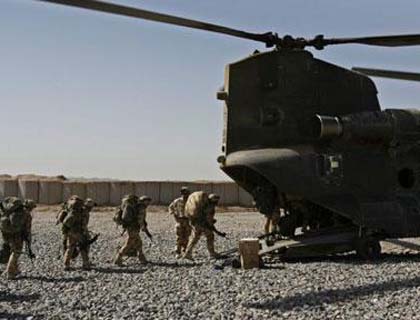We'll continue to bring them home and reduce them to embassy presence by the end of next year, but Afghanistan remains a very dangerous place", said President Barack Obama regarding the US troops during his annual speech at Arlington national cemetery on Memorial Day on May 25, 2015. Though troops remain stationed in Afghanistan, it was the first time in 14 years that the US had celebrated the holiday while not engaged in a major ground war.
The speech came after years of claims by the administration to have created a path to the end of the Afghanistan war, or indeed that it was over, followed by delays in plans for troop withdrawal. More than 2,200 Americans died since 2001 and more than $60 billion was spent on getting Afghan National Security Forces (ANSF) ready to secure the country once NATO troops withdrew, however the investments seem to be waning. Meanwhile, the commander of international forces in Afghanistan said on Saturday that the Islamic State militant group, which is gaining territory in Iraq and Syria despite US airstrikes, is trying to recruit fighters in Afghanistan over social media.
"We don't want it to continue to grow," said General John F Campbell. The nascent democracy is not a panacea for the Afghans' political problems. People fall the victims of militancy to a large extent. Violence and bloodshed have been increased since the drawdown of NATO troops and emergence of the Islamic State (IS). The spring offensive carried out by the Taliban militants led to great casualties across the country. The indiscriminate killings of the civilians have raised the public concerns. Obama has rightly said that "Afghanistan remains a very dangerous place". The fact is that Obama has implied that NATO's counter-terrorism mission met failure in Afghanistan. The longstanding presence of the foreign troops and heavy financial investments may have gone in vain. Due to the rise in militancy on one hand and withdrawal of NATO forces on the other hand, hundreds of militia fighters have been enlisted to battle the Taliban militants near the northern city of Kunduz. The recruitment of unofficial armed groups in Kunduz province is on a larger scale than previous attempts by the government and NATO forces to recruit militias in the fight against the Taliban.
The Taliban's weeks-long siege of Kunduz has involved thousands of militants and brought the insurgents closer to capturing a major city than at any time in years. The scale of the assault and the inability of ANSF to repel it is particularly worrying, because it comes just a few months after NATO ended its combat mission in Afghanistan. Kunduz governor Safi, though, said he was sure the government could keep fighters loyal, and that by recruiting militias, Kabul might in fact be able to control them better. "A large number of them (mujahideen militias) were unhappy with the government, so we tried to bring them into an organized framework," Safi said. However, political analysts believe that rearming the local militias will be highly critical for Afghanistan. According to them, the new anti-terrorist strategy will backfire. In other words, in case of coming to fruition, this milestone will be a pyrrhic victory for the Afghan government. Thomas Ruttig said that creating new layers of forces beyond the ANSF, which is made up of the army and national and local police, could mean more instability.
The question arises is that will foreign forces leave Afghanistan in the lurch and their missions incomplete? Despite stating to "reduce … to embassy presence", speaking after a meeting with NATO Secretary General Jens Stoltenberg on Tuesday, Obama called on all NATO member countries to help stabilize Afghanistan and to offer training and other support to Afghan forces following the drawdown of NATO troops.
He further said the issue will be discussed at a NATO summit in July in the Polish capital city of Warsaw. There are nearly 10,000 American servicemen and women still stationed in Afghanistan serving in non-combat roles, a higher number than Obama originally pledged when he announced his Afghanistan drawdown plan last year. The administration cited security concerns when it announced in March that a higher number of troops would remain there. Based on Obama's urge for stabilizing Afghanistan and the presence of American trainers, who are legalized to stay on the basis of signing Bilateral Security Agreement, there seems a spirit of cooperation in the US officials. The NATO forces will decide in the upcoming summit to complete their counter-terrorism mission in Afghanistan – as Obama has said. But it is too early to pass judgment about their achievements – if they resume their mission in the country. It should be noted that if militancy continues unabated across the country, it will be a bitter pill not only for the Afghan government but also for the foreign troops to swallow.
Moreover, more than a decade of western investments and military loss will be wasted. Similarly, Afghan people will fall the victim of terrorism once more. With the emergence of the Islamic State militants and their recruitment in this war-weary country, the public fear Afghanistan will be changed into second Iraq. Hence, to end the status quo, a strong military operation by international forces is a dire need. Hope the world's common enemy – who are operating either under the white flag of the Taliban or under the black flag of the Islamic State – be rooted out by joining forces in near future.

